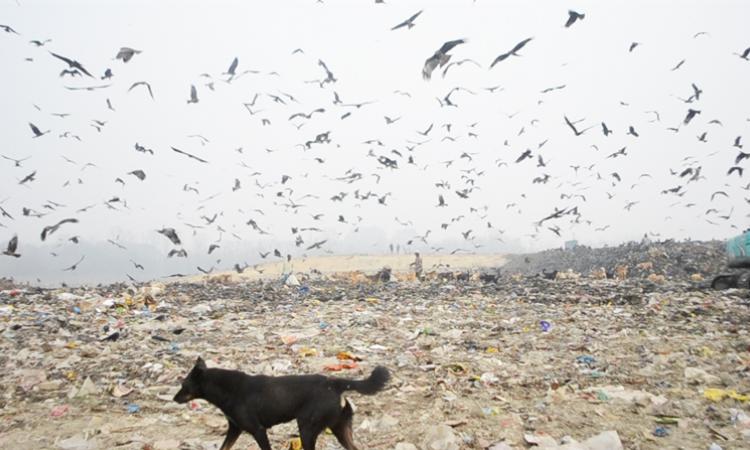
Kashmir was once known for its pristine mountains, lakes, beautiful landscape and clean environment. In the last few decades, however, things have changed. An increasing amount of untreated garbage produced by humans is becoming a critical problem affecting not only the health of the residents of Kashmir but its environment, too. Even the capital city of Srinagar is not without its share of garbage problem.
This untreated garbage is also contaminating the groundwater. For example, Achan is a dumping site in the heart of the Srinagar city. Many environment experts say that the municipal waste in the city is not managed and treated as per scientific guidelines.
Massive quantities of municipal solid waste are thrown on the dumping ground resulting in leachates, a liquid that drains from a landfill and contaminates groundwater. “On the dumping ground, the reason for the stink is the absence of oxygen. The waste is in a heap without any air reaching it. In the absence of oxygen, nitrogen becomes ammonia that smells like urine and sulphur becomes hydrogen sulphide that smells like rotten eggs,” says Almitra Patel, environmentalist and a member of the Supreme Court committee on solid waste management.
The burning of garbage in the open air is another problem that leads to the release of poisonous chemicals into the air. The polluted air, when inhaled by humans and animals, affects their health and can cause respiratory problems.
Mumbai-based agronomist and scientist Dr S. R. Maley found an effective solution to this by using natural and eco-friendly decomposers. The method was first tried in Mumbai where garbage heaps were treated with these biochemicals. The end product of this process was clean, garbage-free land and a significant amount of biosoil.
The decomposing process takes place in many phases. During the process, a particular type of decomposing bacteria is spread on the garbage which eventually converts the garbage into biosoil. The bacterial process raises the temperature of the garbage up to 60 degrees. As a result, the pathogens on the garbage which cause the smell get killed.
The biosoil is used as compost for agricultural use.The compost makes agrarian land very fertile. Its use can also save crores of government expenditure on subsidy on chemical fertilisers. The use of garbage in the form of a resource will not only eliminate pollution but it can help us move towards a cleaner and healthier environment. If proper waste management is done, the waste could be used to generate electricity and compost.
The documentary Untreated Waste--Invitation to Disaster shows how garbage can be converted into useful manure and how it can improve agricultural productivity. The film tries to highlight the method of insidious garbage decomposition by using natural and eco-friendly decomposers.
The above documentary on solid waste management was screened during the Greenmotions Film Festival at Freiburg (Germany) and Kirloskar Vasundhara International Film Festival (KVIFF), Pune.
About the author: Abdul Rashid Bhat is an engineer and a documentary filmmaker working with Educational Multimedia Research Centre (EMMRC), University of Kashmir. His documentary on Dal Lake titled as “The Bitter Truth “ has won the Young Green Filmmaker Award-2016 from Woodpecker International Film Festival and Best Documentary award from APJ International Film festival.
Disclaimer: The views and opinions expressed in these videos are those of the people/organisation(s) that made them and do not necessarily reflect the policy or position of India Water Portal.